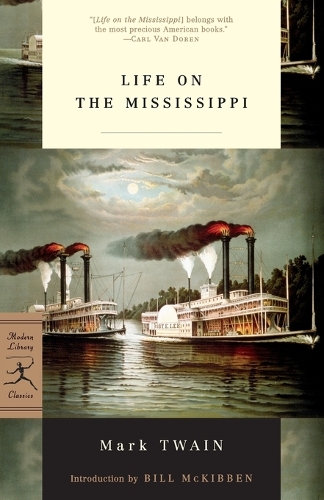
Life on the Mississippi
(Paperback)
Available Formats
Paperback
Published: 28th March 2003
Paperback
Published: 25th April 1985
Paperback
Published: 3rd March 2009
Paperback
Published: 15th June 2007
Paperback
Published: 30th July 2009
Publishing Details
Life on the Mississippi
By (Author) Mark Twain
Introduction by Bill McKibben
Notes by James Danly
Random House USA Inc
Modern Library Inc
15th June 2007
United States
Classifications
General
Fiction
977.031
Physical Properties
Paperback
416
Width 131mm, Height 203mm, Spine 22mm
345g
Description
'I am a person who would quit authorizing in a minute to go to piloting,' Mark Twain once remarked. 'I would rather sink a steamboat than eat, any time.' And in 1882, Twain did just that- he returned to the river of his youth as a mature writer determined to expand seven articles which he had serialized in The Atlantic Monthly in 1875 into the definitive travelogue on the great Mississippi. Although Life on the Mississippi was not commercially successful when first published in May 1883, it is the work that Twain later claimed was the favorite among his books. Twain's rich portrait of the Mississippi also marks a distinctive transition in the life of the nation, from the boom years preceding the Civil War to the sober times that followed. Yet it is infused with the irreverent humor that was his trademark. 'Mark Twain was the first writer who ever used the American vernacular at the level of art,' said Bernard de Voto. 'He had a greater effect than any other writer on the evolution of American prose.'
Author Bio
Mark Twain, born Samuel Langhorne Clemens in 1835, led one of the most exciting of literary lives. Raised in the river town of Hannibal, Missouri, Twain had to leave school at age 12 and was successively a journeyman printer, a steamboat pilot, a halfhearted Confederate soldier, and a prospector, miner, and reporter in the western territories. His experiences furnished him with a wide knowledge of humanity, as well as with the perfect grasp of local customs and speech which manifests itself in his writing. With the publication in 1865 of The Celebrated Jumping Frog of Calaveras County, Twain gained national attention as a frontier humorist, and the bestselling Innocents Abroad solidified his fame. But it wasn't until Life on the Mississippi (1883), and finally, The Adventures of Huckleberry Finn (1885), that he was recognized by the literary establishment as one of the greatest writers America would ever produce. Toward the end of his life, plagued by personal tragedy and financial failure, Twain grew more and more pessimistic-an outlook not alleviated by his natural skepticism and sarcasm. Though his fame continued to widen-Yale & Oxford awarded him honorary degrees-Twain spent his last years in gloom and exasperation, writing fables about "the damned human race."
